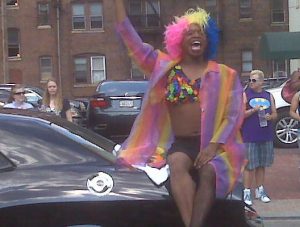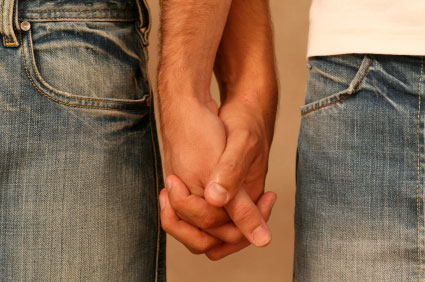Black churches show hypocrisy with civil unions
At a press conference in 1967, actor Sidney Poitier fielded repeated questions from reporters in Atlanta about the “black condition” amid riots taking place in Newark and Detroit. He said this, in a voice of tempered anger:
“I am an artist, man, American, contemporary.”
He said much more in defense of himself, all of which is beautiful, nuanced and worth viewing, but it seems to me what he meant first was, “I am man.”
Move ahead 45 years and most of the black church in Maryland is coming out against “civil unions” with much the same logic, “judge me as man.” In this Democratic state, some may find this stand odd, alarming, even egregious and disingenuous. As a liberal, I too have that reaction. Yet, as an American with great expectations, I am also rather elated. Here is why.
The Catholic church is bonded to the Protestant black and evangelical churches in a way that 50 years ago would have seemed impossible. Sadly, their bond is over the legal disenfranchisement of people covered by “civil union.” Still, this is a coming out party for the black church in America.
Here is a moment where the leadership is saying “we believe this” because of our faith, not our color or history. It also says, whether the church knows it or not, that they are a force and are part of the establishment. So let me restate the obvious. Just as black history is American history and black people are Americans, so too is black politics American politics.
The year was 1960 and the most powerful Catholic in America before John Kennedy’s election was Cardinal Francis Spellman, who presided over the “Powerhouse” in New York City and endorsed a Protestant, Richard Nixon, for president. Then-Sen. John F. Kennedy was forced but clever enough to explain his ability to rule as separate from his Catholic faith to a far more anti-Papist, anti-black, anti-Jewish America.

Catholics voters too, had a chip on their shoulders remembering 1928, when Al Smith was denied the presidency, presumably because of his Roman faith. Still, Kennedy needed to convince a Catholic America that was becoming educated and taking leading roles in society, but still believed in the church, that he was one of them. This he did, winning the Catholic vote overwhelmingly in 1960 and relegating Cardinal Spellman to a very small number two.
The State Of Maryland has a population of just under 6 million that is almost a third black and more than 20 percent Catholic. No surprise as Maryland was founded by a Catholic, Lord Baltimore and as a future slave state, had Catholic slaveholders. These two groups, who are still here, along with Evangelicals are attempting to get the 55,000 signatures needed to bring legislation passed in Annapolis in February to a voter referendum in the fall. Gov. Martin O’Malley, a Catholic, knew the issue would be divisive when he signed the bill into law allowing same sex couples to legally wed.
So again, why is this stand against civil union a good thing? Black America has taken brutal lumps in its march to equality and equity in our society yet the black church has, in many ways, been shielded by the Democratic Party from so many of those beatings. This undercover existence has gone on for decades even while the black church has made political power one of its main thrusts in the public arena. Now that it has taken a stand that directly contradicts the theme of equality in the Democratic Party, it has left itself open to criticism-that’s the good news. The greater news is that the stand against “civil union” will force a dissent within the Black community as a whole.
If we look to when the slums of Baltimore were filled with Catholics we find that a separation between the faithful and the church was coming. It wasn’t the Catholic church that opened the workhouses of the 19th century for the indigent Irish mother of five or more. It was the Protestants who did that and helped to close a secular schism that had been going on for hundreds of years. The Catholic hierarchy meanwhile, complained about the bigotry of this nation while undertaking their own drive for political power. And now, the Black church is following the same American course.
The black church has left itself open to criticism from even its most staunch defenders-black people and liberals. The church not only has to defend itself against calls of bigotry, it has to defend itself against those who ask what the church knows about marriage when three out of four black children are born out of wedlock. This too is a good thing because these are not just black children or somebody else’s children, these are all our children. More than that, they will have to answer to the young and in particular, those they helped to educate.
Catholics of Spellman’s time knew him as possibly the greatest fundraiser for the Vatican. But, in 1960 they also remembered his stand against the “gravediggers” in their 1949 strike and how he called the union men “communists.” Catholics in this city did not forget Monsignor Louis Vaeth of St. Bernardines in West Baltimore as he begged and scolded his parishioners to hold the housing “white line” against black people seeking to buy in Edmondson Village in the late 1950s. While the Second Vatican Council changed so much of what Catholics leaders dictated, so too may the current president change the way the Black church views gay marriage or civil union.
Even if you don’t agree with President Obama’s politics, no one can deny that he is educated, worldly, empathic and forceful – all characteristics we want in our children. The kids, especially the educated, already know this. And they will say to their ministers in the black churches here in Maryland, “thank you for your love, your guidance and your vision.” They will say more too.
The young will tell the ministers that avoiding talking about sex is not good enough because we are ignoring the disease of HIV that is plaguing our communities. When the ministers say “some people just can’t be helped” meaning they haven’t proper faith in the Lord, the young will tell them, “that’s not good enough.” And the young will remind them that Bayard Rustin, a man among men and a gay man, should never have been forgotten for he was the most brilliant strategist of the civil rights movement and a great American.
Black America was never monolithic, so dissent should be no surprise in coming. It’s simply that, for a period, black Americans came together and pushed for equality for themselves and for all Americans and set an example of what this nation and all people can do for the betterment of the human race.
Robert Emmet Mara has been in Baltimore since 2006. A native New Yorker, Robert came to Baltimore to do three things: work with kids, renovate houses and write a second book of fiction. Since his arrival, he has managed to do all three and more.
He has sought better oversight for his still blighted Harwood neighborhood from the city and has been asked to speak to various community association leaders on the subject of city agency relations.

